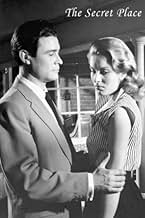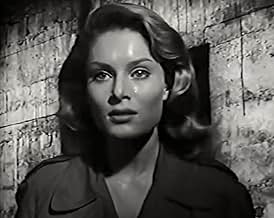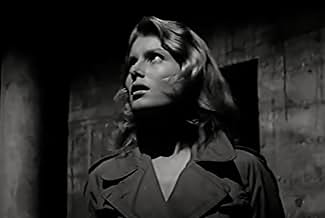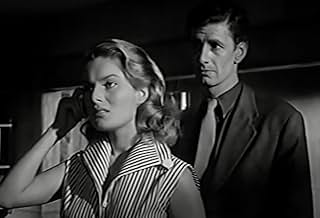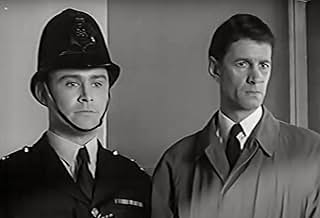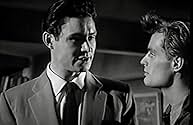Ajouter une intrigue dans votre langueA beautiful redhead becomes involved with a group of small-time hoodlums who plan and perform a daring diamond robbery.A beautiful redhead becomes involved with a group of small-time hoodlums who plan and perform a daring diamond robbery.A beautiful redhead becomes involved with a group of small-time hoodlums who plan and perform a daring diamond robbery.
John Adams
- Police Constable
- (non crédité)
Anne Blake
- Mrs. Wilson
- (non crédité)
Donald Bradley
- Youth in Turntable
- (non crédité)
Fanny Carby
- Woman with Pram
- (non crédité)
Peggy Ann Clifford
- Mrs. Wilson's Neighbour
- (non crédité)
Alan Coleshill
- Undetermined Role
- (non crédité)
Wendy Craig
- Receptionist
- (non crédité)
David de Keyser
- Ticket Clerk
- (non crédité)
Jill Dixon
- Joan
- (non crédité)
Avis à la une
OK, so it does sag somewhat in the middle - but otherwise this is quite a well paced crime drama that sees "Molly" (Belinda Lee) caught up in a plan by her friend "Gerry" (Ronald Lewis) that ensnares her impressionable brother "Mike" (David McCallum) and her even more impressionable young fan "Freddie" (Michael Brooke) into a daring diamond robbery. Turns out the youngster's dad is a policeman, and when he procures - unwittingly - a police uniform to assist the gang with their robbery; things begin to close in on "Molly", "Gerry" and the honest young man who happens upon the stones... There's not a great deal of jeopardy here - we sort of know from the outset what is going to happen, but Lee and the young Brooke are on good form and it shows us quite an interesting perspective on a still recovering post-war London populated by petty gangs and small time thieves who could be pretty brutal as required. It's a bit long and wordy - it could do with a bit more action, but it's got a tight cast with a decent plot that kills 90 minutes easily enough.
In post-war London, a diamond raid is carried out by a gang of small-time crooks. A young boy becomes caught up in the crime when he discovers that the gang has hidden the jewels in his home. They want them back.
A standard British crime thriller interestingly set amongst the homes and ruins in 1950s London. Ronald Lewis is the charming gang leader who will go to any lengths to retrieve the diamonds. Good supporting cast.
A standard British crime thriller interestingly set amongst the homes and ruins in 1950s London. Ronald Lewis is the charming gang leader who will go to any lengths to retrieve the diamonds. Good supporting cast.
Robbery story aside, this film is wonderful in its portrayal of children's lives in the lost world of grimy post-war Britain. A place where 3 year-olds could be allowed to play, unsupervised on bomb-sites amid rusting abandoned cars and ruined buildings. Where "dens" and "camps" could be built and secret places discovered. One priceless scene in this environment is where Freddy's younger brother, having discovered a large diamond, immediately swaps it with another child for a penny. She in turn swaps it with another child and it goes on until it changes hands at the astronomical price of one shilling and three pence (seven and a half p) . Reminded me very much of my own childhood during this period, where swaps were the order of the day. The perceived value of an item often being greater or less than its actual value, depending upon the individuals involved in the deal.
The follow up in the story is an amusing sequence where the Police have to backtrack the deals, questioning the tight-lipped kids, in order to find the diamonds's origin.
Love watching these films. I am always puzzled by the apparent age of kids parents. Freddy is about fifteen. At his age my parents were 36, but his parents look ancient. Belinda Lee, who plays Molly, was 22 at the time, but her mother (Gretchen Franklin) has the appearance of an old age pensioner! Maybe its just their clothes? In American films of the era it's even worse. With grey-haired dowagers parenting 10 year-olds!
I must confess I'm a little surprised by the lackluster rating of 5.1 that this film currently has on IMDb, because it's exactly the kind of movie that deserves reevaluation. Granted, it's no masterpiece. The plot isn't particularly innovative, and the dialog is clunky at times. Perhaps most disturbing of all, since director Clive Donner had been a top editor during the preceding decade, the pacing is too slow. (This kind of movie shouldn't run longer than 85 or 90 minutes.) But it's thoughtful and entertaining. And most importantly, it's an excellent example of the transition that the British film industry was undergoing in the late-1950s. On one hand, its characters are working-class types who feel entrapped by their environment, much like the "Kitchen Sink" dramas that began appearing the following year. Likewise, Donner's interest in youth culture and on-location photography mirrors that of the Free Cinema directors. On the other hand, the moral compass of "The Secret Place" is aligned with the moderate views of Ealing, and poor Belinda Lee is saddled with outdated lines like "you really *must* stop" and "I'd be ever so grateful." (By the way, the gorgeous Lee acquits herself nicely in this rare dramatic role. She was used rather poorly by the Rank Organization.)
What I especially like about "The Secret Place" is its blending of genres. At its most basic level, it's a heist picture. The plot centers around a daring diamond robbery. The second half of the film, however, runs more along the lines of a boys' adventure tale, with young Freddie trying to foil the gang's plans -- not unlike Ealing's "Hue and Cry" (though with far less comedy). Yet the movie also presents us with a vivid and dramatic portrayal of a bombed-out London neighborhood and the interconnected lives of its inhabitants -- much like "It Always Rains on Sunday" and "London Belongs to Me." At heart, this film wants to say something about the bleakness of war-scarred London and the need its younger inhabitants have of escape to a better life. A brief interlude that occurs when Molly and Gerry visit a modern flat they hope to buy with their share of the loot provides subtle but beautiful motivation for their actions.
As the other reviewer points out, most viewers will be interested to see a very young David McCallum in one of his earliest roles, and as I've already mentioned, this movie offers a rare glimpse of Belinda Lee tackling a role that wasn't beneath her. But the real eye-opener is Michael Brooke's superb performance as the adolescent Freddie, whose crush on Molly is exploited cruelly by the gang. Donner's skill with young actors is on full display here: Brooke's depiction of pubescent infatuation with a (slightly) older woman and the heartbreak and loss of innocence that that sort of infatuation can result in is spot-on. Freddie is both precocious and naive -- a combination that's extraordinarily difficult to recreate. It really is one of the best and most overlooked child performances of the decade. It's a shame that Brooke didn't have much of a career afterward. (By the way, IMDb's entry for Brooke apparently confuses him with a much older actor with the same name. Surely, he wasn't born in 1904! However, I know that I've glimpsed him in a couple of other British films from the same period -- "The Mudlark" and "The Long Arm," most notably.)
So if you get a chance to watch this on TV, it's worth your while. (It seems to come on TCM once every year or so.)
What I especially like about "The Secret Place" is its blending of genres. At its most basic level, it's a heist picture. The plot centers around a daring diamond robbery. The second half of the film, however, runs more along the lines of a boys' adventure tale, with young Freddie trying to foil the gang's plans -- not unlike Ealing's "Hue and Cry" (though with far less comedy). Yet the movie also presents us with a vivid and dramatic portrayal of a bombed-out London neighborhood and the interconnected lives of its inhabitants -- much like "It Always Rains on Sunday" and "London Belongs to Me." At heart, this film wants to say something about the bleakness of war-scarred London and the need its younger inhabitants have of escape to a better life. A brief interlude that occurs when Molly and Gerry visit a modern flat they hope to buy with their share of the loot provides subtle but beautiful motivation for their actions.
As the other reviewer points out, most viewers will be interested to see a very young David McCallum in one of his earliest roles, and as I've already mentioned, this movie offers a rare glimpse of Belinda Lee tackling a role that wasn't beneath her. But the real eye-opener is Michael Brooke's superb performance as the adolescent Freddie, whose crush on Molly is exploited cruelly by the gang. Donner's skill with young actors is on full display here: Brooke's depiction of pubescent infatuation with a (slightly) older woman and the heartbreak and loss of innocence that that sort of infatuation can result in is spot-on. Freddie is both precocious and naive -- a combination that's extraordinarily difficult to recreate. It really is one of the best and most overlooked child performances of the decade. It's a shame that Brooke didn't have much of a career afterward. (By the way, IMDb's entry for Brooke apparently confuses him with a much older actor with the same name. Surely, he wasn't born in 1904! However, I know that I've glimpsed him in a couple of other British films from the same period -- "The Mudlark" and "The Long Arm," most notably.)
So if you get a chance to watch this on TV, it's worth your while. (It seems to come on TCM once every year or so.)
Yes I too would like to see the rating higher as "Tryavna" above suggests such that I rated this film 7/10.I bought a job lot from a rare DVD dealer but somehow did not play this title until today.Being born in 1946 I can well remember building sites on which me and friends would play in our free time (very dangerous when I look back).England still had lots of bomb damage in 1957 and bomb site car parks were common.Us children traded objects out of school but I was never offered a real diamond!The afore-mentioned user has adequately commented on the plot and production values and I agree the film needed speeding up somewhat, although it kept my attention to the end.Of course the moral film code was much in evidence in 1957 so that any criminal caper had to show the perpetrators obtaining their just deserts in the end.
Belinda Lee. although mainly a glamour puss in British and continental films in the 1950s, here is given a real acting part which does not just trade on her outstanding physical looks as she has to play a friendly & sympathetic relationship with her young 14 year old co-star.It was sad her life had to end prematurely in a car accident in the USA in 1961.Curiously there was no film music heard in the chase scene on the building site between Lewis, Brookes & Lee.There has been a real life raid recently on a safe deposit in Hatton Garden,London which was in the papers and which makes this film quite topical.
Belinda Lee. although mainly a glamour puss in British and continental films in the 1950s, here is given a real acting part which does not just trade on her outstanding physical looks as she has to play a friendly & sympathetic relationship with her young 14 year old co-star.It was sad her life had to end prematurely in a car accident in the USA in 1961.Curiously there was no film music heard in the chase scene on the building site between Lewis, Brookes & Lee.There has been a real life raid recently on a safe deposit in Hatton Garden,London which was in the papers and which makes this film quite topical.
Le saviez-vous
- AnecdotesFeature directorial debut of Clive Donner.
- GaffesMolly folds the newspaper with the robbery headlines up and puts it inside her handbag, but when Freddie enters the kitchen the folded newspaper is on top of her handbag.
- Citations
Harry: You're late.
Mike Wilson: Yes, I missed the bus this morning.
Harry: You missed the bus years ago.
- Bandes originalesBut You
By Ray Martin (as Lester Powell) and Jack Fishman (as Danny Maule)
Sung by Jimmy Parkinson
Accompaniment directed by Eric Jupp (uncredited)
on a Columbia Record
Meilleurs choix
Connectez-vous pour évaluer et suivre la liste de favoris afin de recevoir des recommandations personnalisées
Détails
- Date de sortie
- Pays d’origine
- Langue
- Aussi connu sous le nom de
- Am Rande der Unterwelt
- Lieux de tournage
- Tom Thumb's Arch underline railway bridge, Mostyn Grove, Bow East, Londres, Angleterre, Royaume-Uni(The place where Molly meets Gerry to tell him she has failed to recover the stolen diamonds from Freddie Haywood. Ordell Road, filmed on a summer evening, can be seen during their conversation as well as electric trains on the Shenfield line.)
- Sociétés de production
- Voir plus de crédits d'entreprise sur IMDbPro
- Durée
- 1h 38min(98 min)
- Couleur
- Rapport de forme
- 1.66 : 1
Contribuer à cette page
Suggérer une modification ou ajouter du contenu manquant

